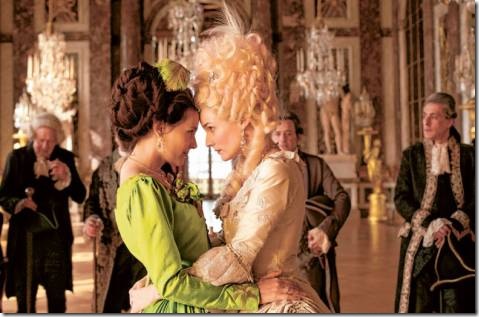In Farewell, My Queen, director Benoît Jacquot’s dramatization of a few days in the lives of Marie Antoinette and her servants, the pampered monarch doesn’t care if anybody eats cake. The storming of the Bastille has just begun, and besides, she has more pressing concerns, like the clandestine love affair she’s having with an adulterous duchess.
Farewell, My Queen is Jacquot’s first film in eight years to receive American distribution, and the film’s salacious story – lipstick lesbians at the dawn of the French Revolution – has no doubt contributed to its presumed appeal. But this based-on-a-true story docudrama never revels in the sordid; the corsets mostly stay on, and when there is nudity, it’s for a powerful emotional purpose.
The story centers on Sidonie Laborde (Léa Seydoux), a servant who manages the queen’s library and reads to her when commanded. The perpetual bags under her eyes testify to a lack of sleep, while the infected mosquito bites that cover her arms suggest her lower-caste environs. She’s infatuated with Antoinette, living by her beck and call; more than once, out of heedless excitement, she trips on the way to visit her.
The Queen (an extraordinary Diane Kruger), however, has her sights on Gabrielle de Polignac (Virginie Ledoyen), the aforementioned duchess, and a woman of more privileged blood – thus setting up an observant love triangle that simmers with sexual and class divisions. The filmmaker whose legacy feels most imprinted on Farewell, My Queen is Rainer Werner Fassbinder – a man who often explored unrequited love and social hierarchies in historical settings, and whose method of slow, boiling zooms is a frequent tool in Jacquot’s arsenal.
There are stretches of Farewell, My Queen that degenerate into talky tedium – segments that may play better in Jacquot’s homeland than they do here. But the decision to make a film about the raid on Bastille that shows nothing of the raid on Bastille is a smart one. He presents a cloistered vision of a country in political flux, one that almost never leaves the hermetic milieu of the Queen’s extravagant palace, exposing its characters to the brutal rays of sunlight only a couple of times. In effect, he’s turned an epic story into an intimate chamber piece, shooting in close-up where other directors might aspire to a long view of history.
It’s the characters, not the situation into which they’ve been thrown, that fascinates Jacquot. His camera surveys his actress’ countenances with unfiltered honesty, penetrating every pore of their anguish. At one point, the Queen removes her periwig and lipstick, which Jacquot films as an act of utmost defiance. When she then screams at her servants to be left alone, it’s as if she’s commanding Jacquot’s now-shaky camera, assuming the mien of some spoiled reality-show star. Kruger and Antoinette become one, and it’s a startling sequence of shots.
This is technically Sidonie’s story – it’s her point of view that always dominates – but it’s Kruger’s Antoinette I’ll remember most vividly, casting steely, manipulative judgment on the underlings around her while her own emotional core is, like, the fortress of Bastille, in a shambles.
FAREWELL, MY QUEEN (Les Adieux à la Reine); Director: Benoît Jacquot; Cast: Diane Kruger, Léa Seydoux, Virginie Ledoyen, Xavier Beauvois. In French with English subtitles. Rated R. Opens today at local theaters.
